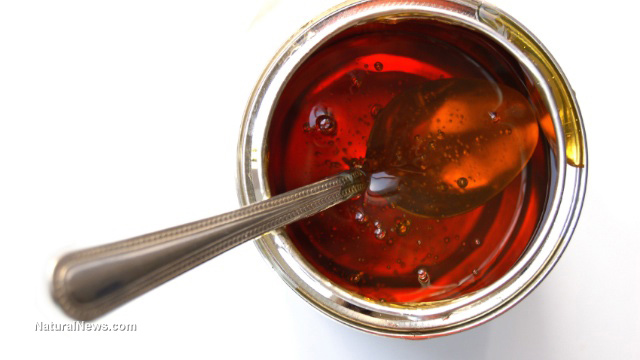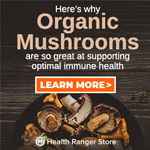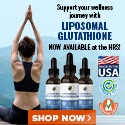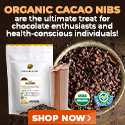Date syrup naturally fights pathogenic bacterial infections
Tuesday, June 21, 2016 by: Amy Goodrich
Tags: date syrup, manuka honey, bacterial infections

(NaturalNews) Dates are a fantastic natural, raw, sweet treat. When turned into a thick, sticky, brown liquid, they make a great natural substitute to sugar, maple syrup or honey. Although date syrup is nothing new – it has been a popular staple in Middle Eastern kitchens and natural treatments for decades – these days, the West is slowly falling in love with its natural sweet taste, too.
Dates are a great source of energy, natural sugars, fibers, antioxidants, vitamins and minerals. They have been used in the Middle East to treat or prevent constipation, intestinal disorders, heart problems, anemia, diarrhea, abdominal cancer and many other conditions.
While these treatments have been passed on from generation to generation and have proven their effectiveness throughout the years, dates and date syrup have recently caught the attention of the scientific world, too.
More effective than manuka honey
Recent research, presented at the Society for General Microbiology's Annual Conference in Birmingham, found date syrup to be as effective, or even better, than manuka honey in fighting a wide range of pathogenic bacterial infections.
Most of the diseases and disorders successfully treated with date syrup are all associated with inflammation and bacterial infections. This sparked the curiosity of Hajer Taleb, a PhD student from the Cardiff Metropolitan University in the UK. She made it her mission to research the antibacterial effects and put these age-old traditional remedies to the test.
For her study, she used date syrup from Basra, southern Iraq, which is considered one of the best regions for date and date syrup production. She was able to identify a number of phenolic compounds that naturally form in the ripening fruits. These little substances already showed some powerful antioxidant and antibacterial activity in previously published work.
When date syrup was mixed with a wide range of bacterial cultures such as the illness-causing Staphylococcus aureus, Escherichia coli, Enterococcus spp. and Pseudomonas aeruginosa, it inhibited their growth in about six hours. Although similar bacterial activity is found in manuka honey, known for its wound-healing properties, date syrup handles it much faster.
Date syrup as a clinical topical treatment
Although research is still in its early stages, Taleb and his supervisor, Ara Kanekanian, believe that date syrup may replace honey as a clinical, topical antibacterial treatment for wound infections in the future.However, Kanekanian remains very cautious and states: "While this work is currently in vitro, it suggests that date syrup could exhibit health benefits through its antibacterial activities, similar, or in some cases, better than honey. At this stage, this has mainly been attributed to the presence of phenolic compounds. However, until further research is undertaken, we caution people against using the syrup to treat wounds."
Be sure to get the real thing
If you are thinking about making the swap and giving date syrup a try, make sure to get the real thing. Taleb also tested the effect of artificial syrups made from constituent sugars found in dates. These lack the phenolic compounds and weren't as effective.Sources for this article include
ScienceAlert.com
MicrobiologySociety.org
OrganicFacts.net
Science.NaturalNews.com
Date syrup at FETCH.news
Get independent news alerts on natural cures, food lab tests, cannabis medicine, science, robotics, drones, privacy and more.
Take Action: Support Natural News by linking to this article from your website
Permalink to this article:
Embed article link: (copy HTML code below):
Reprinting this article:
Non-commercial use OK, cite NaturalNews.com with clickable link.
Follow Natural News on Facebook, Twitter, Google Plus, and Pinterest
- Newly released JFK files reveal Pentagon's role in creating Lyme disease and covid in the same lab
- Dr. Suzanne Humphries makes bombshell appearance on Joe Rogan podcast, exposing vaccine industry deception back to POLIOMYELITIS
- L.A.'s rebuilding nightmare: Only 4 permits issued after fire destroys 6,000 homes
- Discovery of vast underground city beneath Giza pyramids challenges human history
- Black cumin seed oil emerges as a powerful ally against breast cancer and chronic inflammation
- Catastrophic 7.7 earthquake devastates Myanmar and Thailand; death toll could reach 100,000
- The hidden battle in your glass: How A1 and A2 milk could shape your health
- AI breakthrough slashes celiac disease diagnosis time from months to minutes
- Sugar-free deception: Artificial sweeteners hijack hunger signals, fuel obesity epidemic, study warns
- Europe braces for WAR as EU urges citizens to STOCKPILE FOOD, in latest provocations with Russia
- Kiss Your Genetic Privacy Good-Bye! 23andMe Gets Green Light to Sell Your Intimate Genetic Details to Anyone They Want
- Putin vows to 'finish off' Ukraine, accuses West of prolonging the war
- Thomas Massie’s Dual Loyalty Disclosure Act aims to restore American sovereignty by cracking down on foreign influence in Congress
- Aluminum pollution: A silent threat to human health
- Tesla owners under siege: Road rage, vandalism and political backlash fuel fear among drivers nationwide
- Chaos in Amsterdam: Five injured in broad daylight knife attack near Dam Square
- "Feel G.O.O.D. Gut Health Program" on BrightU: Dr. Basima Williams introduces the Feel-Good Plate Method
- Trump's 25% auto tariffs: A bold move to strengthen U.S. manufacturing despite short-term challenges
- Newly released JFK files reveal Pentagon's role in creating Lyme disease and covid in the same lab
- Analysis: The coming economic collapse, a mass uprising and Trump's three secret weapons to halt the growing revolt
- Trump nominates VACCINE ZEALOT Susan Monarez to lead the CDC, sidelining RFK Jr.'s reform efforts
- Trump's greatest betrayal so far: Accelerating Middle East wars, silencing dissent, and serving Zionist masters
- Dr. Mike Yeadon releases 15-minute testimony - WATCH - about genocidal intent of COVID “vaccines”
- Festive flavors: The sweet history, nutritional profile and health benefits of pecan pie
- Elon Musk: Aliens could be here on Earth RIGHT NOW
- Big Pharma's $8 Billion bribery scheme exposed: how doctors are pushed to prescribe junk science, not heal
- 5 Simple steps to boost your brainpower: How to strengthen executive function in a distracted world
- Trump reverses course on Gaza plan, says “nobody is expelling Palestinians”
- A lack of integrity in Academia: Harvard professor found GUILTY of fraudulent research to promote CRT theory
- Reclaim your health: How midlife exercise reverses years of inactivity
- Survival 101: Effective EMF blocking techniques
- Florida takes a stand: DeSantis proposes permanent ban on mRNA vaccine mandates
- Sugarcane extract superior to cholesterol-lowering drugs?
- California's social media censorship law struck down: A victory for free speech or a threat to online safety?
- OpenAI whistleblower who dissented against how the company trained ChatGPT found dead
- EPA advisor admits the agency is funneling billions to climate groups ahead of Trump’s return to White House
- EPA advisor admits the agency is funneling billions to climate groups ahead of Trump’s return to White House
- Newly released JFK files reveal Pentagon's role in creating Lyme disease and covid in the same lab
- California's social media censorship law struck down: A victory for free speech or a threat to online safety?
- Dr. Mike Yeadon releases 15-minute testimony - WATCH - about genocidal intent of COVID “vaccines”
- The Health Ranger releases “Vaccine Zombie” song and music video, using AI-animated zombies for the music video
- The pandemic as a tool for INDOCTRINATION: Understanding “The Indoctrinated Brain” by Dr. Michael Nehls
- Florida takes a stand: DeSantis proposes permanent ban on mRNA vaccine mandates
- “Why we influenced the 2020 elections”: Facebook files reveal the coordinated effort to bury the Hunter Biden laptop story
- Mike Adams releases country western hit single: Goin’ Back in Time is Comin’ Home
- Mike Adams releases music poetry sensation: A Child of God
- Unpacking the Lies That We’ve Been Fed – new song and music video released by Mike Adams, the Health Ranger
- Michigan sheriff announces criminal investigation into 2020 election crimes, Dominion Voting Systems
- Migrants are taking advantage of recent hurricanes to scam residents and loot their homes
- House Intelligence Committee calls for the ARREST and PROSECUTION of Dr. Anthony Fauci
- RFK Jr. clears key hurdle: Sen. Susan Collins backs controversial HHS nominee, signaling a new era for health policy
- Rep. Nancy Mace introduces bill to ban biological males from female facilities on federal property
- Peter Rost exposes Big Pharma corruption in his book “The Whistleblower: Confessions of a Healthcare Hitman”
- Mike Adams releases new song and music video: Nothing More Disgusting Than a Globalist
- Red Cross issues warning to stop blood plasma donations from vaccinated people
- Scientists confirm: GENIUS brain function can be spontaneously unleashed in humans without any apparent cause
- EPA advisor admits the agency is funneling billions to climate groups ahead of Trump’s return to White House
- HYSSOP: What research reveals about the health benefits of this ancient holy herb
- Two containers with completed ballots fall out of truck in Florida
- Fully vaccinated about to see “tsunami” of illness and death, warns virologist
- Global leaders unite to clamp down on “misinformation” with UN-backed Cascais Declaration
- BREAKING: 2025 NDAA authorizes mandatory military draft of WOMEN across America… as Pentagon pursues global NUCLEAR war with both Russia and China at the same time
- Michael Yon warns of a ZIONIST TAKEOVER in Trump’s second administration
- BOMBSHELL: DNA testing kits are a SCAM to develop ethnic-specific bioweapons
- Ozempic and Wegovy weight loss drugs are injectable LIZARD VENOM PEPTIDES that may unleash a devastating wave of organ failure… side effects align with symptoms of SNAKE BITES
- Israeli soldiers accused of even more torture and abuse in the West Bank
- These 13 countries just signed an agreement to engineer a global FAMINE by destroying food supply
- NASA admits that climate change occurs because of changes in Earth’s solar orbit, and NOT because of SUVs and fossil fuels
- RFK Jr. clears key hurdle: Sen. Susan Collins backs controversial HHS nominee, signaling a new era for health policy
- Sermon 30: How Jesus reveals Caesar’s FAKE CURRENCY and FALSE AUTHORITY
- Coriander seeds: Ancient medicine backed by modern science
- Arizona officials claim Maricopa County needs 10-13 days to tabulate results of the election
Science News & Studies
Medicine News and Information
Food News & Studies
Health News & Studies
Herbs News & Information
Pollution News & Studies
Cancer News & Studies
Climate News & Studies
Survival News & Information
Gear News & Information
News covering technology, stocks, hackers, and more



"Big Tech and mainstream media are constantly trying to silence the independent voices that dare to bring you the truth about toxic food ingredients, dangerous medications and the failed, fraudulent science of the profit-driven medical establishment.
Email is one of the best ways to make sure you stay informed, without the censorship of the tech giants (Google, Apple, Facebook, Twitter, YouTube, etc.). Stay informed and you'll even likely learn information that may help save your own life."
–The Health Ranger, Mike Adams












































